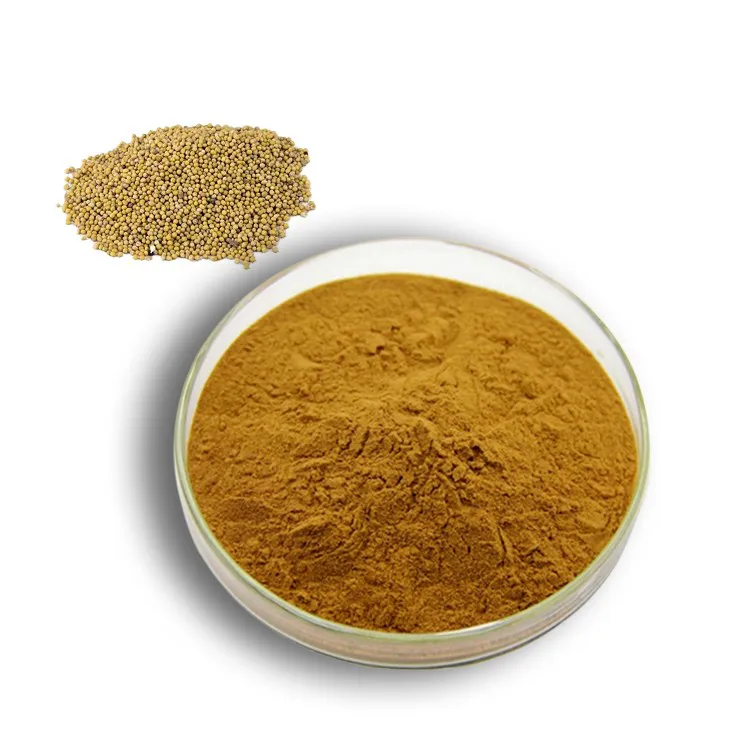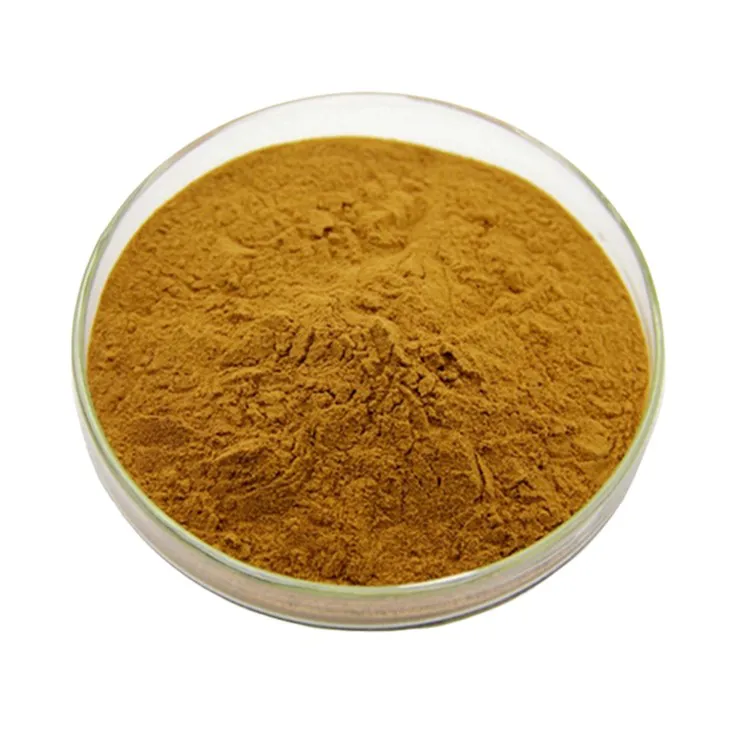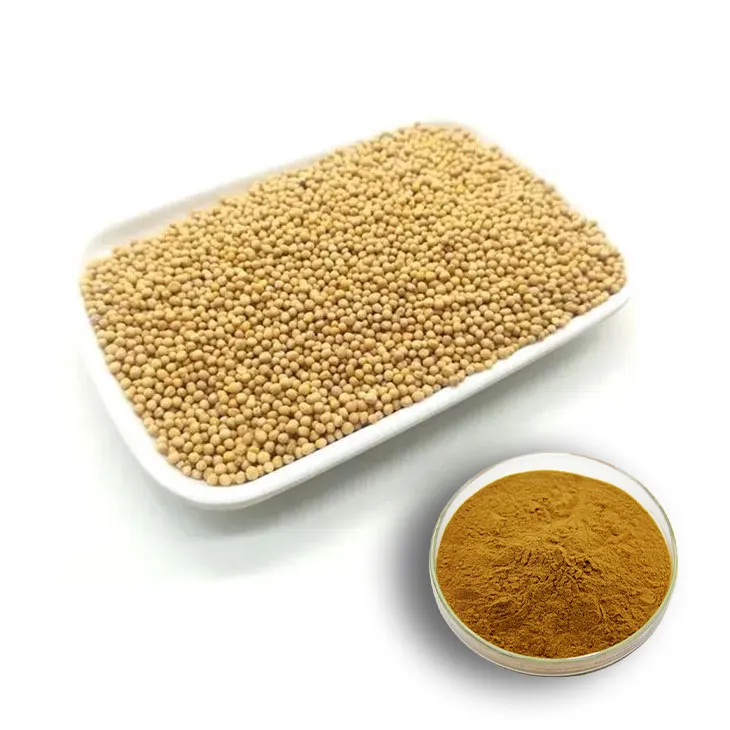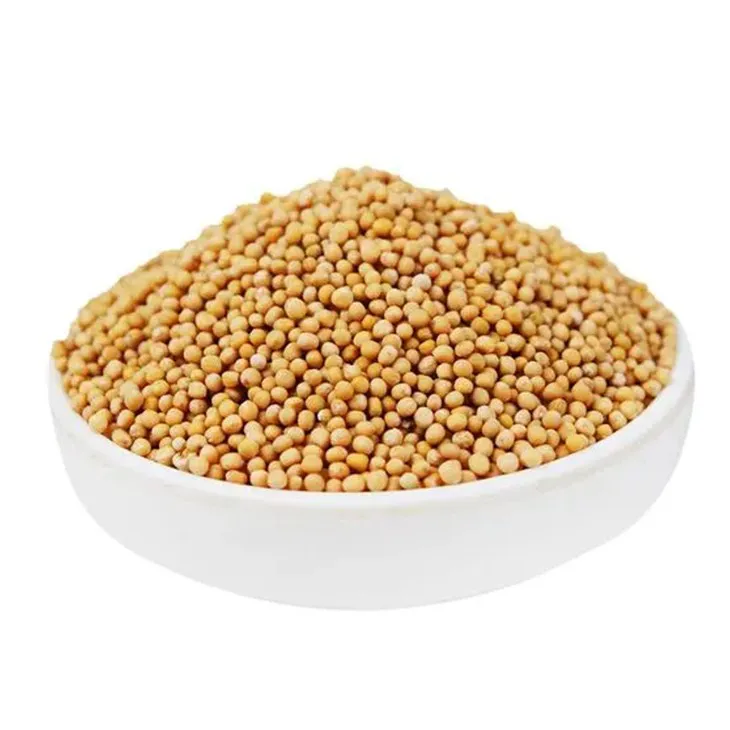- 0086-571-85302990
- sales@greenskybio.com
The flavor of mature white mustard seeds and natural white mustard seed extracts.
2024-11-14

1. Introduction
White mustard (Sinapis alba) has been an important part of human diet and traditional medicine for centuries. Mature white mustard seeds are known for their distinct flavor, which has led to their wide use in the culinary world. Moreover, the natural White mustard seed extracts are also of great interest due to their potential applications in various fields. This article aims to provide a comprehensive analysis of the flavor of mature white mustard seeds and their natural extracts from multiple perspectives.

2. Sensory Features of Mature White Mustard Seeds
2.1 Taste
The taste of mature white mustard seeds is complex and multi - faceted. It has a characteristic pungency, which is not as intense as that of some other mustard varieties like black mustard, but still provides a distinct "hot" sensation on the tongue. This pungency is mainly due to the presence of compounds such as sinigrin. Alongside the pungency, there is a certain degree of bitterness, which is more pronounced in the raw seeds. However, when properly processed, this bitterness can be moderated. Additionally, white mustard seeds also possess a mild nutty flavor, which adds depth to their overall taste profile. This nutty flavor becomes more evident when the seeds are roasted or ground, as the roasting process can bring out the underlying earthy - nutty notes.
2.2 Aroma
The aroma of mature white mustard seeds is equally remarkable. When the seeds are crushed or ground, they release a volatile aroma that is both sharp and somewhat sweet. The sharpness in the aroma is related to the sulfur - containing compounds present in the seeds, which are characteristic of the mustard family. These compounds, upon enzymatic breakdown during crushing or grinding, produce the characteristic smell. The sweetish note in the aroma might be attributed to the presence of certain volatile esters or other minor constituents. This unique aroma can enhance the overall sensory experience when white mustard seeds are used in cooking or food preparation.

3. Properties of Natural White mustard seed extracts
3.1 Chemical Composition
Natural White mustard seed extracts are rich in various bioactive compounds. Sinigrin is one of the most prominent components, which is a glucosinolate. Glucosinolates are sulfur - containing glycosides that are characteristic of plants in the Brassicaceae family. In addition to sinigrin, the extracts also contain enzymes such as myrosinase. When the seeds are crushed or the extract is prepared, myrosinase acts on sinigrin, leading to the formation of allyl isothiocyanate, which is responsible for much of the pungency associated with white mustard. Other components in the extract may include proteins, lipids, and various minerals. For example, white mustard seeds are a good source of phosphorus, magnesium, and potassium, and some of these minerals may also be present in the extract in small amounts.
3.2 Physical Properties
The physical properties of white mustard seed extracts can vary depending on the extraction method. Generally, the extracts are liquid in form, with a color that can range from light yellow to amber, depending on the degree of concentration and purity. The viscosity of the extract can also vary, with more concentrated extracts having a higher viscosity. These physical properties can have an impact on how the extract is used in different applications, such as in food formulation or in the production of cosmetic products.

4. Application in the Food Industry
4.1 As a Flavoring Agent
- White mustard seeds and their extracts are widely used as flavoring agents in the food industry. In the production of processed meats such as sausages and deli meats, white mustard seed extracts can add a characteristic flavor and aroma. The pungency of the mustard helps to cut through the richness of the meat and provides a contrast in taste.
- They are also used in salad dressings. The sharp and tangy flavor of white mustard can enhance the overall taste of the dressing, making it more appealing. For example, a simple vinaigrette with added white mustard seed extract can have a more complex and interesting flavor profile.
- Another area of application is in baked goods. In some traditional bread recipes, white mustard seeds are added. The seeds not only contribute to the flavor but also add a unique texture. The nutty flavor of the seeds can complement the flavors of the flour and other ingredients in the bread.
4.2 As a Preservative
- White mustard seed extracts have shown potential as natural preservatives. The antimicrobial properties of certain compounds in the extract, such as allyl isothiocyanate, can help inhibit the growth of spoilage - causing microorganisms. This can be particularly useful in the preservation of perishable food products like dairy products and fresh - cut fruits.
- In the case of pickles and fermented foods, white mustard seed extracts can play a dual role. They can contribute to the flavor while also helping to prevent the growth of unwanted bacteria and fungi during the fermentation and storage processes.

5. Potential Therapeutic Properties
5.1 Anti - Inflammatory Effects
Some studies have suggested that compounds in white mustard seeds and their extracts may have anti - inflammatory properties. Glucosinolates and their breakdown products have been shown to modulate the body's inflammatory response in vitro and in some animal models. This could potentially make white mustard - based products useful in the management of inflammatory conditions such as arthritis, although further research in humans is needed.
5.2 Digestive Health Benefits
- The pungency of white mustard can stimulate the production of saliva and gastric juices, which can aid in digestion. This can be beneficial for people with sluggish digestion or those who have a reduced appetite.
- Furthermore, some of the compounds in white mustard seed extracts may have a prebiotic - like effect, promoting the growth of beneficial gut bacteria. A healthy gut microbiome is associated with overall health, including improved immune function and better digestion.
5.3 Anticancer Potential
Although the research is still in its early stages, there are indications that certain components in white mustard seed extracts may have anticancer potential. Glucosinolates, for example, have been studied for their ability to induce apoptosis (programmed cell death) in cancer cells in laboratory studies. However, it is important to note that these findings are far from conclusive and much more research is required to determine if white mustard can be used as a potential anticancer agent in humans.
6. Conclusion
In conclusion, the flavor of mature white mustard seeds and their natural extracts is a fascinating subject with far - reaching implications. Their unique sensory features make them valuable in the food industry as flavoring agents and preservatives. Moreover, the potential therapeutic properties suggest that they could have a role in promoting human health. However, more research is needed to fully understand and harness the benefits of white mustard seeds and their extracts. With continued exploration, it is possible that white mustard could become an even more important ingredient in various fields, from food to medicine.
FAQ:
What are the main sensory features of mature white mustard seeds?
Mature white mustard seeds typically have a pungent and somewhat spicy flavor. They also have a characteristic nutty undertone. The aroma is sharp and can be quite strong, which is a result of the various chemical compounds present in the seeds.
How is the natural white mustard seed extract obtained?
The natural white mustard seed extract is usually obtained through processes such as solvent extraction. This involves using solvents like ethanol or water to draw out the active compounds from the mustard seeds. After extraction, the solvent is removed, leaving behind the concentrated extract which contains the flavor and potentially beneficial compounds of the white mustard seeds.
What are the applications of white mustard seeds and their extracts in the food industry?
White mustard seeds and their extracts are widely used in the food industry. They are used as flavor enhancers in various products such as sausages, pickles, and salad dressings. The pungent flavor adds a unique zing to these food items. They can also be used in spice blends to add depth of flavor. In some cases, the extract may be used in baked goods for a unique flavor profile.
Do white mustard seeds or their extracts have any potential therapeutic properties?
There are some potential therapeutic properties associated with white mustard seeds and their extracts. For example, they may have anti - inflammatory properties due to the presence of certain bioactive compounds. Some studies suggest that they could also have antibacterial effects. However, more research is needed to fully understand and confirm these potential health benefits.
How can the flavor of white mustard seeds and their extracts be preserved?
To preserve the flavor of white mustard seeds and their extracts, proper storage is crucial. They should be stored in a cool, dry place away from direct sunlight. In the case of extracts, they may be stored in airtight containers to prevent oxidation, which can affect the flavor. Additionally, adding antioxidants in some cases can help in maintaining the flavor stability.
Related literature
- Flavor Profiles of Mustard Seeds: A Comprehensive Study"
- "The Therapeutic Potential of White Mustard Seed Extracts: Current Research"
- "Applications of White Mustard Seeds in the Modern Food Industry"
- ▶ Hesperidin
- ▶ citrus bioflavonoids
- ▶ plant extract
- ▶ lycopene
- ▶ Diosmin
- ▶ Grape seed extract
- ▶ Sea buckthorn Juice Powder
- ▶ Beetroot powder
- ▶ Hops Extract
- ▶ Artichoke Extract
- ▶ Reishi mushroom extract
- ▶ Astaxanthin
- ▶ Green Tea Extract
- ▶ Curcumin Extract
- ▶ Horse Chestnut Extract
- ▶ Other Problems
- ▶ Boswellia Serrata Extract
- ▶ Resveratrol Extract
- ▶ Marigold Extract
- ▶ Grape Leaf Extract
- ▶ blog3
- ▶ blog4
- ▶ blog5
-
Organic Tongkat Ali extract powder factory.
2024-11-14
-
How to make powder with ashwagandha extract.
2024-11-14
-
Rosehip extract manufacturers from China.
2024-11-14
-
The best cat's claw extract in nature.
2024-11-14
-
Chinese Dandelion Leaf Extract Suppliers.
2024-11-14
-
Saponin Extract
2024-11-14
-
Kelp Extract Powder
2024-11-14
-
Mango flavored powder
2024-11-14
-
Grapefruit Seed Extract Powder
2024-11-14
-
Moringa powder
2024-11-14
-
Lily extract
2024-11-14
-
Oyster Mushroom Extract Powder
2024-11-14
-
Horse Chestnut Extract
2024-11-14
-
Nettle leaf extract
2024-11-14
-
Sophora Japonica Flower Extract
2024-11-14





















